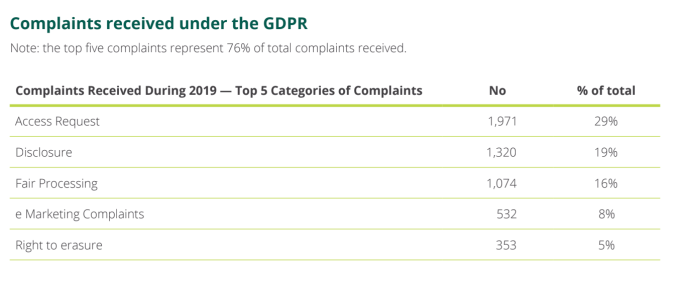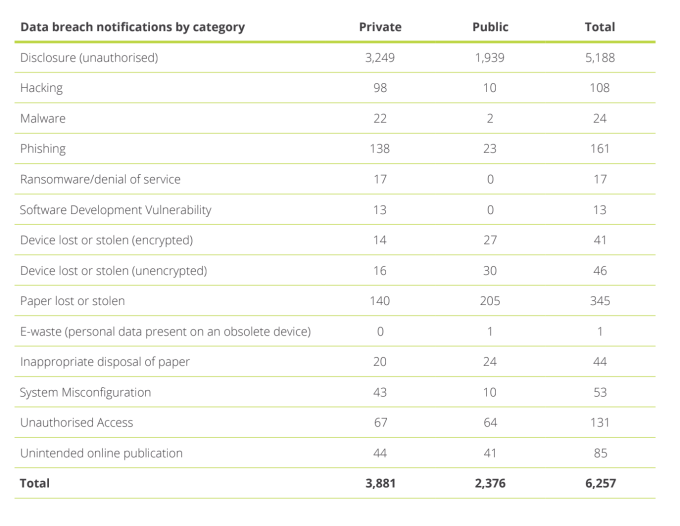The lead European Union privacy regulator for most of big tech has put out its annual report which shows another major bump in complaints filed under the bloc’s updated data protection framework, underlining the ongoing appetite EU citizens have for applying their rights.
But what the report doesn’t show is any firm enforcement of EU data protection rules vis-a-vis big tech.
The report leans heavily on stats to illustrate the volume of work piling up on desks in Dublin. But it’s light on decisions on highly anticipated cross-border cases involving tech giants including Apple, Facebook, Google, LinkedIn and Twitter.
The General Data Protection Regulation (GDPR) began being applied across the EU in May 2018 — so is fast approaching its second birthday. Yet its file of enforcements where tech giants are concerned remains very light — even for companies with a global reputation for ripping away people’s privacy.
This despite Ireland having a large number of open cross-border investigations into the data practices of platform and adtech giants — some of which originated from complaints filed right at the moment GDPR came into force.
In the report the Irish Data Protection Commission (DPC) notes it opened a further six statutory inquiries in relation to “multinational technology companies’ compliance with the GDPR” — bringing the total number of major probes to 21. So its ‘big case’ file continues to stack up. (It’s added at least two more since then, with a probe of Tinder and another into Google’s location tracking opened just this month.)
The report is a lot less keen to trumpet the fact that decisions on cross-border cases to date remains a big fat zero.
Though, just last week, the DPC made a point of publicly raising “concerns” about Facebook’s approach to assessing the data protection impacts of a forthcoming product in light of GDPR requirements to do so — an intervention that resulted in a delay to the regional launch of Facebook’s Dating product.
This discrepancy (cross-border cases: 21 – Irish DPC decisions: 0), plus rising anger from civil rights groups, privacy experts, consumer protection organizations and ordinary EU citizens over the paucity of flagship enforcement around key privacy complaints is clearly piling pressure on the regulator. (Other examples of big tech GDPR enforcement do exist. Well, France’s CNIL is one.)
In its defence the DPC does have a horrifying case load. As illustrated by other stats its keen to spotlight — such as saying it received a total of 7,215 complaints in 2019; a 75% increase on the total number (4,113) received in 2018. A full 6,904 of which were dealt with under the GDPR (while 311 complaints were filed under the Data Protection Acts 1988 and 2003).
There were also 6,069 data security breaches notified to it, per the report — representing a 71% increase on the total number (3,542) recorded last year.
While a full 457 cross-border processing complaints were received in Dublin via the GDPR’s One-Stop-Shop mechanism. (This is the device the Commission came up with for the ‘lead regulator’ approach that’s baked into GDPR and which has landed Ireland in the regulatory hot seat. tl;dr other data protection agencies are passing Dublin A LOT of paperwork.)
The DPC necessarily has to do back and forth on cross border cases, as it liaises with other interested regulators. All of which, you can imagine, creates a rich opportunity for lawyered up tech giants to inject extra friction into the oversight process — by asking to review and query everything. [Insert the sound of a can being hoofed down the road]
Meanwhile the agency that’s supposed to regulate most of big tech (and plenty else) — which writes in the annual report that it increased its full time staff from 110 to 140 last year — did not get all the funding it asked for from the Irish government.
So it also has the hard cap of its own budget to reckon with (just €15.3M in 2019) vs — for example — Google’s parent Alphabet’s $ 46.1BN in full year 2019 revenue. So, er, do the math.
Nonetheless the pressure is firmly now on Ireland for major GDPR enforcements to flow.
One year of major enforcement inaction could be filed under ‘bedding in’; but two years in without any major decisions would not be a good look. (It has previously said the first decisions will come early this year — so seems to be hoping to have something to show for GDPR’s 2nd birthday.)
Some of the high profile complaints crying out for regulatory action include behavioral ads serviced via real-time bidding programmatic advertising (which the UK data watchdog has admitted for half a year is rampantly unlawful); cookie consent banners (which remain a Swiss Cheese of non-compliance); and adtech platforms cynically forcing consent from users by requiring they agree to being microtargeted with ads to access the (‘free’) service. (Thing is GDPR stipulates that consent as a legal basis must be freely given and can’t be bundled with other stuff, so… )
Full disclosure: TechCrunch’s parent company, Verizon Media (née Oath), is also under ongoing investigation by the DPC — which is looking at whether it meets GDPR’s transparency requirements under Articles 12-14 of the regulation.
Seeking to put a positive spin on 2019’s total lack of a big tech privacy reckoning, commissioner Helen Dixon writes in the report: “2020 is going to be an important year. We await the judgment of the CJEU in the SCCs data transfer case; the first draft decisions on big tech investigations will be brought by the DPC through the consultation process with other EU data protection authorities, and academics and the media will continue the outstanding work they are doing in shining a spotlight on poor personal data practices.”
In further remarks to the media Dixon said: “At the Data Protection Commission, we have been busy during 2019 issuing guidance to organisations, resolving individuals’ complaints, progressing larger-scale investigations, reviewing data breaches, exercising our corrective powers, cooperating with our EU and global counterparts and engaging in litigation to ensure a definitive approach to the application of the law in certain areas.
“Much more remains to be done in terms of both guiding on proportionate and correct application of this principles-based law and enforcing the law as appropriate. But a good start is half the battle and the DPC is pleased at the foundations that have been laid in 2019. We are already expanding our team of 140 to meet the demands of 2020 and beyond.”
One notable date this year also falls when GDPR turns two — because a Commission review of how the regulation is functioning is looming in May.
That’s one deadline that may help to concentrate minds on issuing decisions.
Per the DPC report, the largest category of complaints it received last year fell under ‘access request’ issues — whereby data controllers are failing to give up (all) people’s data when asked — which amounted to 29% of the total; followed by disclosure (19%); fair processing (16%); e-marketing complaints (8%); and right to erasure (5%).

On the security front, the vast bulk of notifications received by the DPC related to unauthorised disclosure of data (aka breaches) — with a total across the private and public sector of 5,188 vs just 108 for hacking (though the second largest category was actually lost or stolen paper, with 345).
There were also 161 notification of phishing; 131 notification of unauthorized access; 24 notifications of malware; and 17 of ransomeware.




























